L71新概念1,71课
新概念英语第一册第71课一般过去时电子版本
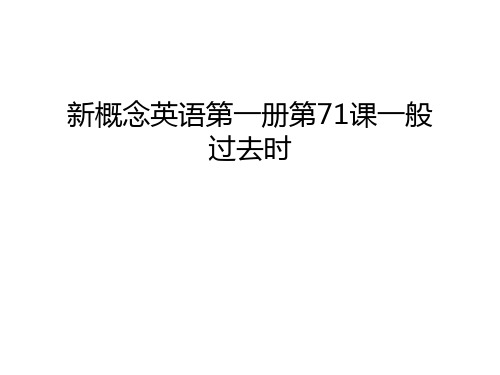
adj. 让人讨厌的,坏的 adv. 非常(在表示负面的情景中,可用
awfully代替very)
I am awfully(very) sorry.
• time n. • ①次(数)C • once • twice • 3 times ≥3 数词+times • ② 时间 U • on time 按时 • in time 及时 • all the time 一直
新概念英语第一册第71课一般 过去时
• awful 让人讨厌的 • telephone 打电话 • time 次数 • answer 接电话 • last 最后,上一个 • phone 电话 • again 又一次地 • say 说
• say the poem again
Key words:
★awful awfully
speak with sb (spoke) Can I speak with you for a minute?
What‘s Ron Marston like? • what’s someone like? • 询问某人或某物怎么样?(问内在) • What’s the weather like yesterday? • It was windy and rainy. • What’s your little sister like? • She’s cute and clever.
yesterday. Did you sing songs together yesterday? Yes, we did . No, we didn't .
What did you sing together yesterday?
他们昨天晚上给我打电话了。
They telephoned me last night. They didn't telephone me last night. Did they telephone you last night? Yes,they did. No, they didn't. What did they do last night?
新概念1 Lesson 71

➢answer ➢telephone ➢arrive ➢do ➢don’t ➢am ➢is ➢are ➢say
answered telephoned arrived did didn’t was was were said
大家来找茬
找出一般过去式的单词
say — said
Pauline is typing letters. She can’t speak to you now!
say+说的内容
say to 对……说
speak +语言
speak to 与……说话
现在进行时 be + V-ing
正在……
letters 字母,信
Then I arrived home at six o’clock
yesterday evening. He telephoned again. But I didn’t answer
the phone!
arrive — arrived arrive home 到家
Did he telephone again last night?
Yes, he did. He telephoned at
FREE TALK
1. What did you do yesterday? 2. Do you have a telephone? 3. Did someone awful telephone you before?
Lesson 71
He’s awful !
他讨厌透了!
awful /'ɔ:ful/ adj.糟糕的; 可怕的
Yes, he did.
新概念英语第一册71课课文
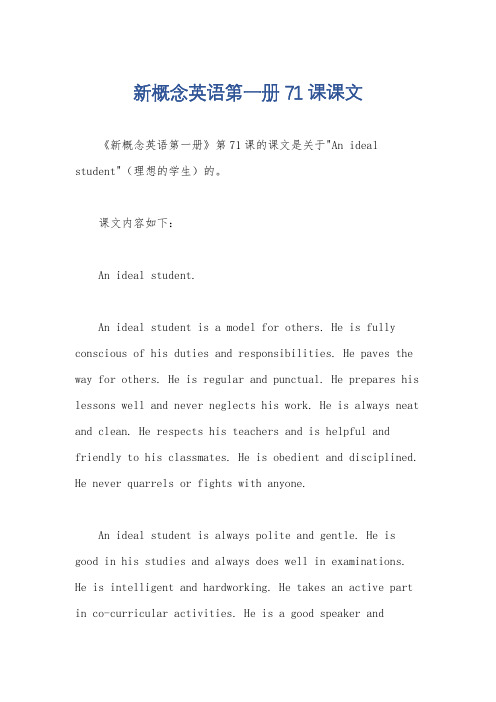
新概念英语第一册71课课文《新概念英语第一册》第71课的课文是关于"An ideal student"(理想的学生)的。
课文内容如下:An ideal student.An ideal student is a model for others. He is fully conscious of his duties and responsibilities. He paves the way for others. He is regular and punctual. He prepares his lessons well and never neglects his work. He is always neat and clean. He respects his teachers and is helpful and friendly to his classmates. He is obedient and disciplined. He never quarrels or fights with anyone.An ideal student is always polite and gentle. He is good in his studies and always does well in examinations. He is intelligent and hardworking. He takes an active part in co-curricular activities. He is a good speaker anddebater. He is also good in sports and games. He is a well-rounded personality.An ideal student is ambitious and has a clear vision of his future. He sets goals for himself and works hard to achieve them. He is focused and determined. He knows the importance of education and strives for excellence in his academic pursuits. He is self-motivated and never gives up easily.An ideal student is not only concerned about his own growth but also about the welfare of others. He is kind and compassionate. He helps those in need and participates in social service activities. He is aware of the issues and challenges faced by society and actively contributes to its betterment.In conclusion, an ideal student is a role model for others. He possesses qualities like discipline, dedication, intelligence, and compassion. He strives for excellence in all aspects of life and works towards personal growth as well as the betterment of society.以上是《新概念英语第一册》第71课的课文内容。
新概念1第71课

构成2:行为动词,表示过去某一时间发生的动作
行为动词变一般过去时的构成
1.一般在动词后直接加-ed
answer-answered wait---waited
2.以不发音的e结尾的动词直接加_dtelephone---telephoned arrive---arrived
3.以辅音加y结尾的,把y改为i,再加ed empty--emptied
2.对……作出反应;响应
answer the phone/telephone
接电话
answer the door/doorbell
应声开门
Mary took a few minutes to answer the door. 玛丽拖了几分钟时间才去开门。
n. 答案 ,办法 Do you know the answer to Question 10? 你知道问题10的答案吗? This is the only answer to this problem. 这是解决这个问题的唯一办法。
2.speak to sb. 与某人说话 May I speak to Pauline, please? I'd like to speak to Pauline, please. 在电话中回答:This is….
一般过去时 II
概念:过去时间发生的动作或存在的状态。
构成1:be动词,表示过去时间存在的状态 be 的过去式是was 和were,was 用于第一人称和第三人称单数,were用于其他人称, 如:We were there at four o'clock.(P140) Were you at the butcher's?(P133) I was at home on Saturday.(P136)
新概念英语第一册第71课一般过去时ppt课件
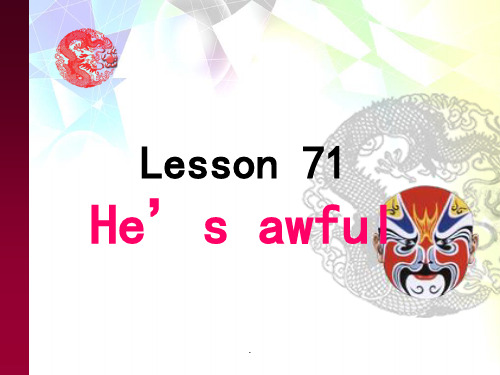
answer. • a telephone box
.
time n. 时间,次数
• once 一次 twice 两次 • three times 三次 四次 four times
• Time goes by so quickly these days. • 我们一个月看他三次。 • We visit him three times a month . • It's time to do sth. • It's time to go home.
Lesson 71
He’s awful
.
• awful 让人讨厌的 • telephone 打电话 • time 次数 • answer 接电话 • last 最后,上一个 • phone 电话 • again 又一次地 • say 说
• say the poem aga. in
Key words:
.
answer v./n. 接(电话),回答
• What is the answer to the question?
• 她了吗? • answer thetelephone • 接电话
.
phone n. 电话
.
again adv. 又一次
• once again 再来一次 • again and again 一次又一次 • Can you say it again?
• I will never go there again. • 他昨天又给你打电话了吗? • Did he telephone you again
yesterday? .
新概念英语1Lesson_71
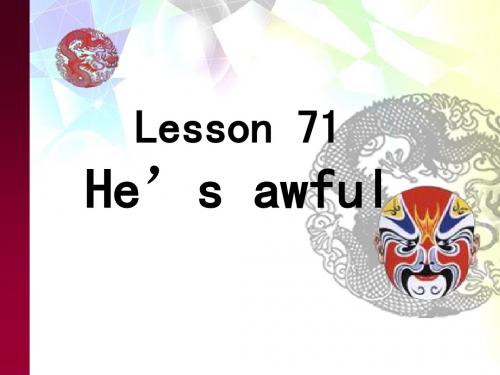
New words:
★ time ① n. 可数名词表示次(数) ● once 一次 ● twice两次 ● three times 三次(≥3数词+times) He telephoned me four times yesterday. 他昨天给我打了四次电话。 ② n. 不可数名词表示时间 ● on time 按时,准时 ● in time 及时 ● all the time 一直 ●once upon a time 很久很久以前
Lesson 71
He’s awful
New words:
★ awful adj. 让人讨厌的,坏的 He’s awful/terrible.他讨厌透了。 The weather is awful 天气糟糕透了。
New words:
★ telephone ① v. 打电话 call、phone、ring也表示打电话的意思。 He telephoned me four times yesterday. 他昨天给我打了四次电话。
New words:
★ say ① v. 说 What did you say to him? 你对他怎么说的? ●said 过去式
② v.说,say、speak、tell、talk的区别 ●say to sb.对某人说 ●speak to sb. 与某人说话(常用于打电话) ●speak 某种语言,speak English ●tell sth. to sb.告诉某人某事 ●talk sth. with sb.与某人谈论某事
Notes on the text:
新概念英语第一册Lesson71-76课后答案

新概念英语第一册Lesson71~76课后答案新概念英语第一册Lesson71~72课后答案A1 It is raining now. It rained yesterday.2 It is snowing now. It snowed yesterday.3 He is boiling some eggs. He boiled some yesterday.4 We are enjoying our lunch. We enjoyed it yesterday, too.B1 What did they do yesterday? They cleaned their shoes yesterday.2 What did he do last night? He opened the box last night.3 What did they do this morning? They sharpened their pencils this morning.4 What did she do this evening? She turned on the television this evening.5 What did she do last night? She listened to the radio last night.6 What did she do yesterday morning? She boiled an egg yesterday morning.7 What did they do yesterday afternoon? They playeda game yesterday afternoon.8 What did he do in the morning the day before yesterday? He stayed in bed in the morning the day before yesterday.9 What did she do yesterday evening? She telephoned her husband yesterday evening.10 What did she do the night before last? She called the doctor the night before last.新概念英语第一册Lesson73~74课后答案A1 He read the phrase slowly.2 He worked lazily.3 He cut himself badly.4 He worked carefully.5 The door opened suddenly.B1 He does not know me very well.2 She worked very hard.3 She smiled pleasantly.4 The bus went hurriedly.5 He shaved slowly.6 She drank a glass of water thirstily.7 He greeted me warmly.8 We enjoyed ourselves very much.新概念英语第一册Lesson75~76课后答案A1 She met her friends yesterday.2 They drank some milk yesterday.3 He swam in the river yesterday.4 She took him to school yesterday.5 He cut himself yesterday.B1 When did you walk across the park? I walked across the park last week.2 When did you wash your hands? I washed my handsa minute ago.3 When did you work in an office? I worked in an office the year before last.4 When did you ask a question? I asked a question five minutes ago.5 When did you type those letters? I typed those letters a month ago.6 When did you watch television? I watched television every day this week.7 When did you talk to the shop assistant? I talked to the shop assistant last month.8 When did you thank your father? I thanked myfather an hour ago.9 When did you dust the cupboard? I dusted the cupboard three days ago.10 When did you paint that bookcase? I painted that bookcase the year before last.11 When did you want a car like that one? I wanteda car like that one a year ago.12 When did you greet her? I greeted her a minute ago.。
新概念英语第一册第71课课件NCE1lesson71

again 再次,又一次 but 表示转折 telephone的缩写:phone
Lesson 71 He’s awful!
Did he telephone again last night? Yes, he did.
did是do的过去式,过去式变一般疑 问句时用did做助动词。 last night 昨晚,前一晚 last morning 昨天早上 last evening 昨天晚上
He’s awful. be awful 让人讨厌的,厌恶的 = make sb. sick
Gegewu is awful. Gegewu makes me sick.
Lesson 71 He’s awful!
He telephoned me four times yesterday, three times the day before yesterday.
Lesson 71 He’s awful!
What’s Ron Marston like, Pauline?
What is … like? 。。。怎么样? What’s the weather like? 天气怎么样? What’s Tom like? Tom人怎么样?
Lesson 71 He’s awful!
Lesson 71-72
Ellie 2012-11-29
Are you ready?
Review Words 听力 课文 练习 总结
Review
Review
一般过去时 句子结构 否定句 一般疑问句 否定疑问句 缺席 在某地 成百上千 介词in/ at/ on
answer the telephone 接电话 answer的过去式 answered
新概念英语第一册71课课文
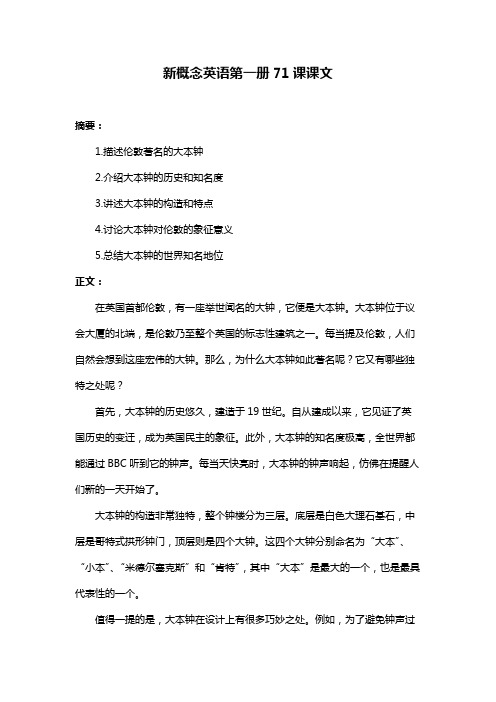
新概念英语第一册71课课文
摘要:
1.描述伦敦著名的大本钟
2.介绍大本钟的历史和知名度
3.讲述大本钟的构造和特点
4.讨论大本钟对伦敦的象征意义
5.总结大本钟的世界知名地位
正文:
在英国首都伦敦,有一座举世闻名的大钟,它便是大本钟。
大本钟位于议会大厦的北端,是伦敦乃至整个英国的标志性建筑之一。
每当提及伦敦,人们自然会想到这座宏伟的大钟。
那么,为什么大本钟如此著名呢?它又有哪些独特之处呢?
首先,大本钟的历史悠久,建造于19世纪。
自从建成以来,它见证了英国历史的变迁,成为英国民主的象征。
此外,大本钟的知名度极高,全世界都能通过BBC听到它的钟声。
每当天快亮时,大本钟的钟声响起,仿佛在提醒人们新的一天开始了。
大本钟的构造非常独特,整个钟楼分为三层。
底层是白色大理石基石,中层是哥特式拱形钟门,顶层则是四个大钟。
这四个大钟分别命名为“大本”、“小本”、“米德尔塞克斯”和“肯特”,其中“大本”是最大的一个,也是最具代表性的一个。
值得一提的是,大本钟在设计上有很多巧妙之处。
例如,为了避免钟声过
于刺耳,钟匠们特意将钟声调成低音。
此外,大本钟的钟摆采用了特殊的材料,以减缓钟摆的摆动速度,使钟声更加悠扬动听。
大本钟对伦敦的意义远不止一座著名的建筑。
它象征着英国人民的团结和坚韧,代表着国家的历史和文化。
在很多重要场合,如新年、国庆日等,大本钟的钟声都会响起,提醒人们庆祝这个特殊的时刻。
总之,大本钟作为伦敦的标志性建筑,在世界范围内享有盛誉。
它的独特之处和历史价值使其成为英国乃至全球的瑰宝。
新概念英语第一册第71课教学内容

一般过去时
yesterday yesterday morning yesterday afternoon yesterday evening last night the day before yesterday the day before yesterday in the morning the day before yesterday in the afternoon the day before yesterday in the evening the night before last
记
2.以不发音的e结尾的动词直接加_d
哦!
telephone---telephoned arrive---arrived
3.以辅音加y结尾的,把y改为i,再加ed
empty--emptied
4.不规则动词have-had forget-forgot
say-said go-went run-ran
do-did take -took
Test time
Revision
phone awful
time
anga[i'telif[ə'ɔul:anf]ustle[]əle'gpehino]ne
[sei] [fəun]
[taim] t answer
['ɑ:nsə]
[lɑ:st]
say
awful adj. 让人讨厌的,坏的 例如:他很讨厌 He's awful!
Key words:
一般过去时的构成:
陈述句:主语+动词过去式+其他 主语+be动词过去式+其他 He arrived home at six o’clock yesterday evening. We were students three years ago
新概念第一册第71课(课堂PPT)

其他语言点
answer the phone 接电话 He telephoned me yesterday. 打电话给某人 He telephoned the office yesterday. 给办公室打电话
21
其他语言点
This is Pauline’s mother. 我是… This is Susan. This is Susan speaking. Who is calling? 你是谁?
34
看电视 昨天晚上
When did they watch TV? They watched TV last night.
35
复习 review
daily expression
规则动词的过去式
there be
What is 某人 like?
they are…
36
37
7
翻译练习
TOM是怎样一个人? 他讨厌透了. 他昨天给我打了4次电话. 前天打了3次. 他又打了没有? 没有
8
一般过去时
概念:表示过去某一时间发生的动作 或存在的状态,通常以动词的过去式 表示,其否定句和各种疑问句靠助动 词did构成。
9
一般过去时
1.一般在动词后直接加-ed) answer-answered wait-waited
did +主语+动词原形+其它?句末用问号。 肯定回答:Yes, …did. 否定回答:No, …didn’t.
➢Did he telephone you four times yesterday? ➢Yes, he did . / No, he didn’t.
12
一般过去时
4.) 特殊疑问句: 特殊疑问词+ did +主语+动词原形+其 它?句末用问号。
(完整版)新概念第一册71课习题

新概念一L71-72练习题姓名________ 分数_________一、英汉互译1、让人讨厌的,坏的2、打电话,电话3、次(数)4、接(电话)5、最后的,前一次的6、电话7、又一次地8、说9、昨天下午10、前天11、昨夜12.telephone him13.four times 14.Beijing time15.answer the phone st night二、用动词的正确形式填空。
1.Look! The boys___________________(play) football there.2.I enjoy_________________(listen) to the radio very much.3.I________________(be) at home yesterday.4.She didn't__________________(call) the doctor the night before last.5.What did he_______________(say) to you yesterday?6.He______________(live) in Beijing last year.7.They________________(not be) at school the day before yesterday.8.She_____________________(not open) the box yesterday.9.We________________(see) our teacher tomorrow.10.She often__________________(enjoy) herself.11.She_________________(call) the doctor the night before last.12.She_______________(not open) the box last night.13.It______________(rain) heavily yesterday.14.He_______________(get) up very late yesterday morning.三、按要求写出动词正确形式。
新概念英语第一册lesson71

一、用行为动词的适当形式填空
lived 1. He _________ (live) in Xuan Wu two years ago. 2. The cat ________ ate (eat) a bird last night. 3. We _______ had (have) a party last Halloween. 4. Nancy ________ picked (pick) up oranges on the farm last week. 5. I ________ made (make) a model ship with Mike yesterda y. played (play) chess in the classroom last PE 6. They ________ lesson. cooked(cook) a nice food last Spring F 7. My mother _______ estival. 8. The girls ________ (sing) and _______ (dance) at th e part
speak主要指说什么语言 如:She speaks English. 她说英语。 say主要指说话的内容 如:“I am a teacher.”he says. 他说:“我是一名教师.” talk主要指和什么人说话和谈论什么事情,一般和 to,with,about连用 如 :He likes talking to/with me. 他喜欢和我谈话 He is talking about learning English. 他正在谈论关于学许英语得事情
3、以辅音字母 + y结尾的动词,把-y变为-i 再加-ed,如:
study---studied copy---copied cry---cried carry--carried
新概念1 Lesson71-72

拓展:
Key words:
★ time n. 次(数) time在英语中作不可数名词时,表示 “时间”; 作可数名词时表示“次数”,三次或 三次以上通常用基数词+times表示: once, twice, three times
Key words:
time常用短语:
on time 按时,准时 in time 及时 all the time 一直
• 杰克灯 • 杰克灯是万圣节最广为人 知的象征物。在英国和爱 尔兰,当地人原本在挖空 的芜菁中燃点蜡烛造成杰 克灯,但移民到美国的人 很快便采用南瓜代替,因 为南瓜比较大和容易在上 面雕刻图案。不少家庭在 南瓜上刻上吓人的面容, 并放在大门口的阶梯上, 传统上此做法是想吓走恶 魔或妖怪。
• 咬苹果 • 万圣节前夜最流行的游 戏是“咬苹果游戏” • (Bobbing for Apples) 游戏时,人们让苹果漂 浮在装满水的盆里,然 后让参与者在不用手的 条件下用嘴去咬苹果, 谁先咬到,谁就是优胜 者。
★ answer [ˈɑ:nsə] v. 接(电话)
① v. 对……作出反应;响应 answer the phone/telephone 接电话 answer the door/doorbell 应声开门 玛丽拖了几分钟时间才去开门。 It takes Mary a few minutes to answer the door.
新概念英语第一册Lesson71

Then I arrived home at six o’clock yesterday evening.
He telephoned again. But I didn’t answer the phone.
Then I arrived home at six o’clock yesterday evening.
He telephoned the office yesterday morning and yesterday afternoon.
He telephoned the office yesterday morning and yesterday afternoon.
My boss answered the telephone.
At six o’clock.
Did she answer the phone?
Nd Ron Marston telephone last night?
At nine o’clock.
Did he telephone you again?
4.不规则动词have-had forget-forgot
say-said go-went run-ran
do-did take -took
一般过去时的练习
air----aired clean---cleaned open---opened
sharpen---sharpened turn on---turned on
Test time
Revision
phone awful
time
aga[i'ntelif[ə'ɔu:nf]utle[]əle'gpehino]ne
last
新概念英语第一册第71课

第十பைடு நூலகம்页,共28页。
Key words:
一般现在时
today
this morning
this afternoon
this evening
tonight
一般过去时
yesterday
yesterday morning yesterday afternoon yesterday evening
last night
the day before yesterday
the day before yesterday in the morning
the day before yesterday in the afternoon the day before yesterday in the evening
the night before last
2. Twice means two t_________.
3. I can’t hear you very cleimarelsy. Could you say it a_________? 4. The phone isgariinnging. Please a_________ the
phone.
play---played
stay---stayed
shave---shaved climb---climbed call---called
